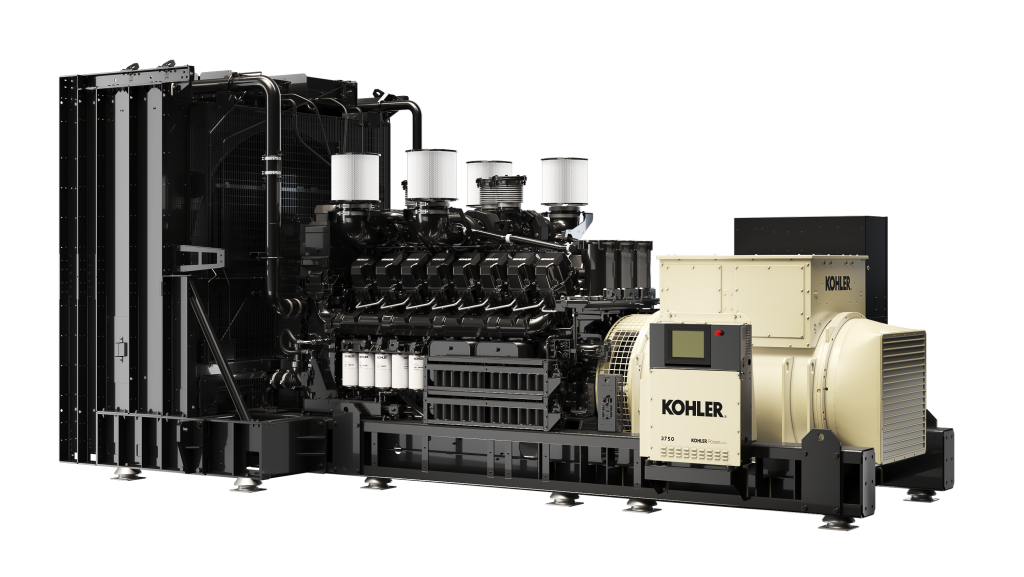
Independently verified document provides complete visibility of environmental impact across the lifecycle.
Kohler, Wis – June 25, 2024: Power Systems, part of Kohler Energy, has published the first certified environmental declaration for a generating set in mission-critical markets, providing customers with information about the KD SeriesTM product’s environmental impact across the entire lifecycle. The data-driven document supports more sustainable purchasing decisions and helps end users implement low-carbon strategies while transitioning to net zero.
The environmental declaration – in the form of a PEP ecopassport®– has initially been issued for the KD3750-F backup generator as a reference product, but the baseline data will be extrapolated to calculate the environmental impact of other generators in the K175 series family from KD2000 to KD4500. A PEP is a Type III environmental declarationaccording to the ISO 14025 standard, providing comprehensive information about environmental impact at every stage of the lifecycle.
KD SeriesTM generators provide mission-critical power in applications such as data centers, hospitals, and water treatment plants. While the PEP ecopassport® covers generators made in France, Kohler Energy plans to introduce similar Environmental Declaration for product made in the US.

“The publication of the market’s first environmental declaration for a generating set is a crucial step in our long-term sustainability strategy,” says Charles Hunsucker, President of Power Systems at Kohler Energy. “The transparent and standardized information in the document provides mission-critical generator customers with complete visibility about the environmental impact of generators from KD2000 to KD4500 – allowing them to make informed buying decisions as part of low carbon strategies. Kohler Energy is the first company to publish an environmental declaration for a generating set in mission-critical markets, emphasizing leadership in sustainable technologies.”
The environmental declaration provides granular data on the environmental impact of activities such as raw material extraction, manufacture, distribution, installation, use, and end-of-life of KD SeriesTM generators. The lifecycle assessment methodology saw Kohler Energy collaborate with key suppliers to collect information on energy consumption, emissions, resource usage, and other relevant parameters. The environmental declaration was then verified by independent third parties to ensure accuracy and compliance with standards.
The lifecycle analysis generated some revealing insight. It showed that a KD3750-F emergency generator with an internal combustion engine comprises over 94% recyclable metals, and without the use of rare materials like lithium, nickel, manganese, or cobalt in the electric batteries. The analysis also indicated the environmental benefit of using renewable fuels such as Hydrotreated Vegetable Oil (HVO).
The publication of the first environmental declaration forms part of a broader Kohler Energy sustainability strategy, which includes improving generator efficiency while investing in zero-emissions technologies. For example, Kohler Energy’s entire range of mission-critical diesel generators is compatible with HVO, which is made entirely from biobased raw materials, including vegetable oils, waste oils, residual oils, and animal fats. By comparing the well-to-electricity life cycles of fossil diesel and renewable fuels, HVO can help reduce carbon emissions by up to 90% without needing any modifications.
Meanwhile, Power Systems has also launched Conscious Care™, a new maintenance program that includes multiple maintenance protocols to help customers lower Greenhouse Gas Emissions and reduce their carbon footprint. Additionally, Power Systems has launched its first hydrogen fuel cell power system, a 100 kW Solid Polymer Electrolyte Membrane fuel cell using green hydrogen for emergency backup, peak shaving, and demand response.
“We remain committed to offering a diverse range of power solutions and strategies that meet the varied needs of our customers as they transition to net zero,” adds Charles Hunsucker.




